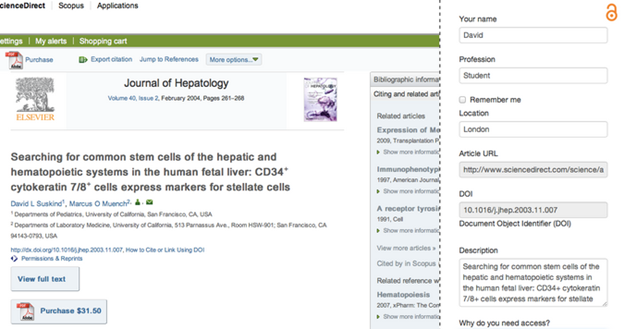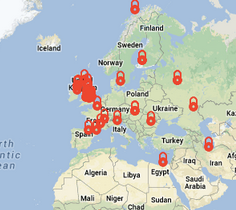On Tuesday I went to an OKFN data evening in London (5 min from Kings Cross, so easy). They are occasions to meet new people and new ideas. On Tuesday we heard from David Carroll and Joseph McArthur medical/pharmacology undergraduates who are ANGRY. They are ANGRY because they frequently encounter paywalls that stop them reading the medical literature. Unlike most #openaccess advocates they are reaching outside the academic system. They’ve had a big impact already and some of their activities are detailed on their blog (oabutton.wordpress.com) – and they’ve made a lot of contacts and goodwill including PLOS-Cameron Neylon and SPARC-Alma Swan (who have provide funding). There isn’t a home page yet (I have urged them to do so) so I’ll quote from a recnt mail, and then from Cameron’s article (http://cameronneylon.net/blog/guest-post-the-open-access-button/ )
“Every day people hit thousands of paywalls and are denied access to the research they need. Our button will capture these moments and display them in an innovative and provoking way to change the broken scholarly publishing system. The button also try to get you access to those papers. Incentivising use in order to create real change.” (David/Joseph)
Imagine a browser-based tool which allowed you to track every time someone was denied access to a paper? Better yet, imagine if that tool told gave you basic information about where in the world they were or their profession and why they were looking. Integrating this into one place would create a real time, worldwide, interactive picture of the problem. The integration of social media would allow us to make this problem visible to the world. Lastly, imagine if the tool actually helped the person gain access to the paper they’d been denied access too in the first place. Incentivising use and opening the barriers to knowledge combined can make this really powerful.
That’s what we’re imagining. We’re calling it the Open Access button. Every paywall met is an isolated incident; it’s time we capture those individual moments of injustice and frustration to turn them into positive change.
So here’s the problem paywall (left, costs 31.5 USD for a day’s read) and the button (right). You report to the world that you’ve hit a paywall. That is now logged as a restriction of the flow of scientific information – effectively only rich universities can read this paper (and they are not yet feeling angry enough to change the system urgently).

So the button allows you, the potential reader of the article – who might be a patient, or a charity donor, or a politician, or … to record that you are angry. And, positively, to find copies of the paper that you can get immediately and without payment. After all this only has to be done once – the button would also point you to a free source.
Yes, there are free copies of many papers. It’s generally called “Green OA”. It’s a mess, because universities haven’t created an index, because some copies aren’t in university repositories, and because it’s very patchy. Some authors proactively make GreenOA available, most don’t. Some Universities are proactive, most aren’t. So the OA_Button tells the #scholarly poor where they can find a copy.
In reality most papers won’t be freely available because many publishers don’t promote Green OA and many are actively against it. After the Finch report some publishers increased the embargo period from 0 to 1 or even 2 years. This means the paper is technically “OA” but you can’t actually read it for another year or two – by which time the research will be out of date. So the effect of the OA_Button will be to highlight the scale of the problem, and to shock all involved into getting immediate visibility for all articles.

They’ll plot the results by country. Here’s a snippet of their map.
Note that they are not advocating illegal practices (though it’s very unclear what is legal and what isn’t).
I’m hoping this will engender a wave of anger in the #scholarlypoor, those who don’t have access to the literature and who are often regarded as irrelevant by academia. Repositories are mainly built for the benefit of academics or in response to government mandates, not to provide information to the wider world. (I’d be glad to hear of evidence to the contrary, #scholarlypoor who regularly used repositories to find information).
David and Joseph have a large number of technical problems to solve. But their biggest challenge is getting YOU, especially outside academia, involved.
HTH.